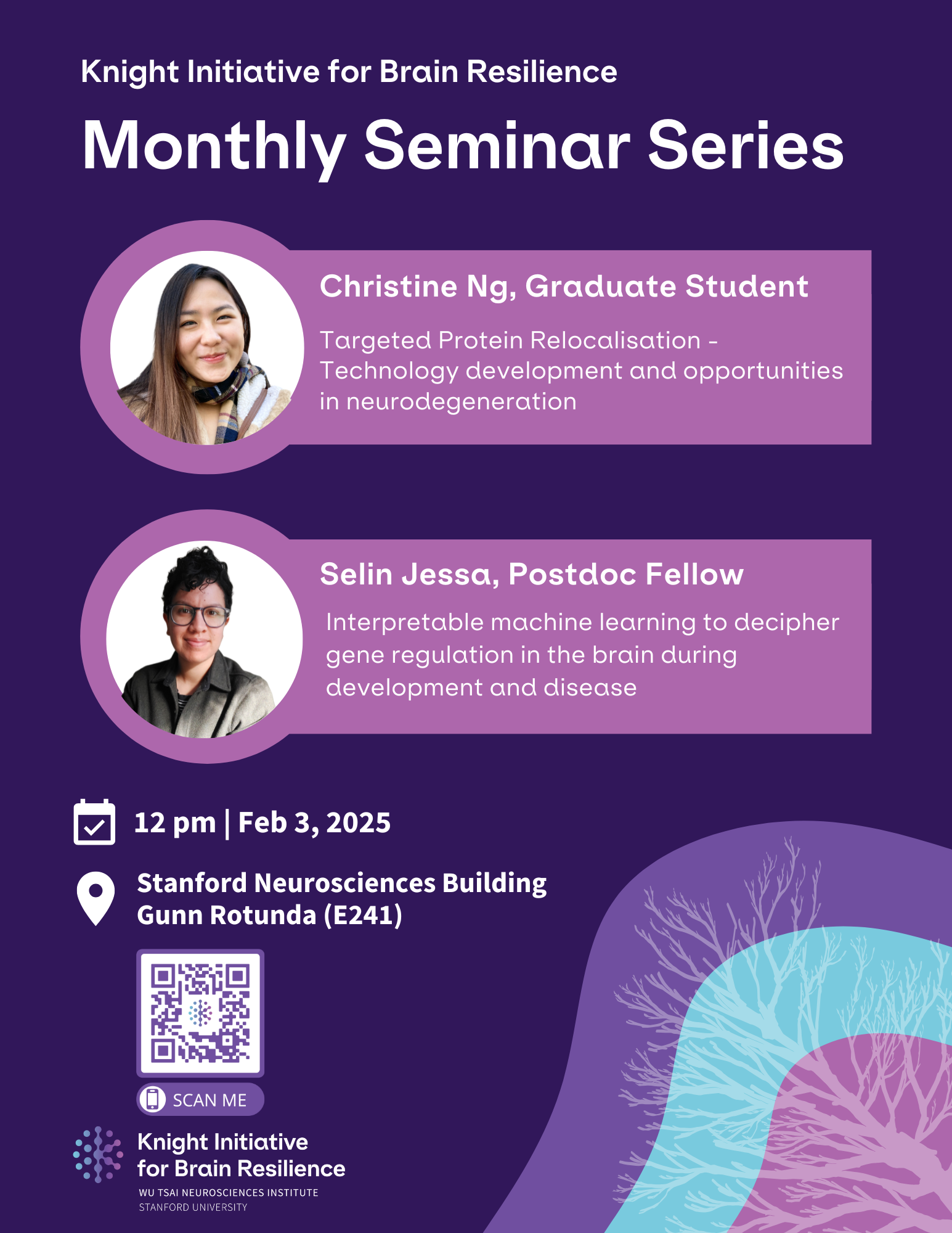Event Details:

The first Monday of each month, the Knight Initiative for Brain Resilience will host monthly seminars to bring together awardees, affiliated professors and students for a series of 'lab meeting' styled talks. Two speakers will discuss their brain resilience research, experiences in the field, and answer questions about their work.
To support our researchers' participation in this open science ‘lab-meeting style’ exchange of ideas, these seminars are not streamed/recorded and are only open to members of the Stanford community.
Christine Ng, Stanford University
Targeted Protein Relocalisation - Technology development and opportunities in neurodegeneration
Subcellular protein localisation is crucial for protein function and is commonly disrupted in neurodegeneration. We develop Targeted Relocalisation Activating Molecules (TRAMs) that enable precise modulation of target protein localisation via shuttle protein coupling. Protein steady-state localisation can be modulated by coupling target proteins with shuttle proteins exhibiting strong localisation sequences and appropriate expression levels. We generate scores for relative protein relocalisability and localisation strength, highlighting the hierarchy of protein localisation through various target and shuttle protein combinations. We uncover key features that facilitate protein trafficking hijacking and identify endogenous shuttle proteins with potent ligands suitable for incorporation into TRAMs, enabling the relocalisation of endogenous proteins (PRMT9, SOS1, FKBP12). TRAMs utilising nuclear hormone receptors as shuttles induce nuclear import of mislocalised mutant proteins associated with neurodegeneration (FUSR495X, TDP43ΔNLS). Additionally, FUSR495X can be extracted from pre-formed stress granules. TRAM-induced relocalisation of NMNAT1 from the nucleus to the axon slows axonal degeneration upon injury.
The TRAM approach is being studied on a range of endogenous targets to probe resultant phenotypic changes and establish general rules. NMNAT1 relocalisation in glaucoma mice models is being investigated in collaboration with the Hu lab, and relocalisation of mislocalised proteins are being probed in ALS disease models.
Selin Jessa, Stanford University
Interpretable machine learning to decipher gene regulation in the brain during development and disease
Gene regulation during embryonal development ensures that cells differentiate in the right place and time. This process is directed by the binding of sequence-specific transcription factors to short DNA sequences, which drive cell type-specific gene expression. Deciphering this regulation is critical for understanding the etiology of neurodevelopmental and psychiatric disease, because genetic variants observed in disease often impact these regulatory DNA sequences, but they are difficult to causally link to disease.
We combine single-cell genomics with a “glass-box” interpretable deep learning strategy. First, to chart the transcription factors active during development, we profile gene expression and DNA accessibility at the single-cell level during human fetal development and in brain organoids. We train deep learning models to use DNA sequence to predict epigenome profiles, and then systematically interpret what the models learned to extract specific DNA sequences and transcription factors that determine cell state. Next, we extend this strategy to profile post-mortem brains from individuals with schizophrenia or bipolar disorder, and matched controls, through the PsychENCODE Consortium. We use deep learning models on these data to predict the effects of noncoding genetic variants on the epigenome. Ultimately, this work will identify causal steps in gene regulation and disease.

